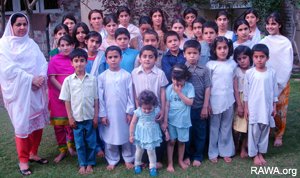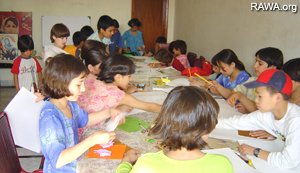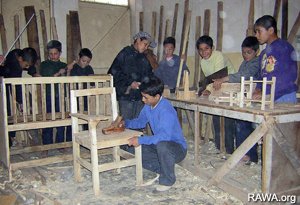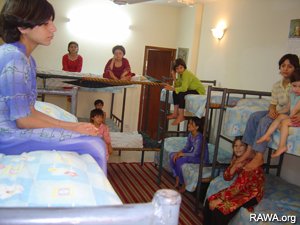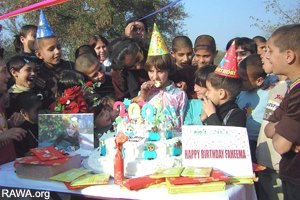Afghan orphans reshape their lives at RAWA orphanages
Overview of RAWA orphanages in Pakistan and Afghanistan
Background: Afghanistan has been at war continuously for almost three decades. These conflicts have left behind a legacy of complete turmoil; millions of deaths, destruction of the whole landscapes and collapse of the country’s infrastructure. Undoubtedly, the bulk of this tragedy was borne by the children and women who are the most vulnerable segment of any society and therefore the prime victims of this calamity. The children have suffered the horrors of kidnapping and child trafficking, sexual abuses, child labor in addition to appalling humiliation and degradation.
UNICEF and other reliable sources provide heart-wrenching statistics estimating the wretched conditions of the Afghan children: 60% of children have lost at least one member of their family or close relatives; 35% of children have lost one of their parents, over 600,000 children sleep on streets, for every 50,000 there is one physician or doctor and of the 200,000 disabled people 50% are children.
Revolutionary Association of the Women of Afghanistan (RAWA), the oldest feminist organization of Afghanistan established in 1977, is implementing creative solutions to the legacies of war. RAWA struggles for peace, democracy, freedom and women’s rights in a nation that is continually challenged by Islamic fundamentalists, international terrorism and the drug mafia. This noble cause requires great attention to the children, who are indeed the biggest victims of this ongoing tragedy in Afghanistan. With the generous help of its supporters, RAWA opened 9 orphanages in Pakistan and Afghanistan and cares for nearly 400 children to give them love, education, shelter and parental care.
The Child Sponsorship Program was launched by RAWA with the help of international individual donors in late 2004. (details...)
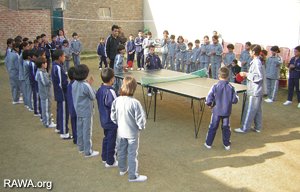
Life at RAWA orphanages
One of the criteria for selecting the children and taking them to the orphanage is their economical and social status; therefore, most of them are orphans, victims of child labor and street children forced to beg. They have been exposed to very hostile and painful environments, polluted by drug mafia, armed gangs and religious extremism. Today’s culture in Afghanistan is strongly dominated by the medieval and decaying ideology of the Islamic fundamentalism. Children are the most vulnerable to this indoctrination especially if they are alone and without guidance.
The children enter the orphanage in a state of wonder. This new environment is worlds' apart from their prior lives; a place where they can sleep and eat without fear, where they can smile and have fun. Most of all, the orphanage is a safe haven where they can begin a new live based on peace, love and respect.
RAWA established these orphanages to provide not only food, shelter, clothing and education to these suffering children but to help them grow into productive members of a civic society. RAWA’s goal is to raise the next generation of Afghan citizens who will help their war-ravaged nation.
The framework of the orphanage environment is to live in peace, love, tolerance and harmony. The basic tenet is to respect others regardless of gender, language, religion, race, color, etc. The children are taught and encouraged to live within these boundaries. Every effort is made for the children to acquire these basic human rights principles. The family, cook and other adults living with the children in the orphanage are strictly prohibited from using any violence but to treat them with love and care.
The governing policy behind this environment is RAWA Educational Policy that provides the orphanage administration with a basic code of human rights principles.
Orphanage Administration: RAWA is directly involved in the administration and management of the orphanages. A RAWA member who has been appointed as the Coordinator of the orphanages is the head of a decision-making team comprised of other RAWA members. The main task before this team is to assure that the orphanages are following the framework of RAWA’s Education Policy.
Each orphanage is managed by a husband and wife who live with the children in the orphanage. This couple acts as surrogate parents to guide the children through their daily life. All of RAWA’s orphanages follow the same basic routine:
Breakfast: The children start their day at 7 O’clock in the morning, making all the preparations for the school. After brushing their teeth and washing their faces, they all gather in the dinning hall to have their breakfast; a cup of milk with a nan (Afghan special brown bread), and sometimes boiled egg.
Going to School: All children attend a school administered by RAWA. They are divided into two groups on the basis of their classes at school; the morning group starts at 8.00 and finishes at 12:30 and the afternoon group starts at 1:00 and goes till 5:30. Unlike other schools, RAWA schools do not follow restrictive fundamentalist doctrine. All the school teachers are well-versed in RAWA’s educational policies and believe in true democratic values and freedoms.
Doing Homework: The children gather in their study room daily and finish their class work. They are encouraged to help each other, and if need be, they can get assistance from the administrator, who is available in the orphanage the whole day. The study room is fully equipped with all necessary school items to make sure the children can complete their homework.
Lunch & Dinner: Lunch time varies based on the children’s school grouping; but everyone eats dinner together. A proper and balanced food menu has been prepared by the coordinator that has considered all of the nutritional requirements of the children. The children eat a light meal filled with vegetables at dinner, while meat, beans and rice are included in the lunch menu. As well as the routine meals, fruits are also part of their food program. The children take variety of seasonal fruits that are available at market.
Extra Classes/Training Courses: In addition to their school program, children take extra classes on the English language and computers in the evening. They also attend training courses on tailoring and carpentry at the orphanage. Girls take the tailoring course and boys take carpentry. These extra classes and training courses are equally important to the school program. The main objective is to empower these children with some life-skills that will help their earning power in future.
Physical Exercise: Physical activities like badminton, table tennis, football and etc are parts of their daily program. For safety reasons, girls exercise on the small lawn of their orphanage; but boys go outside and play football and cricket. These activities are fun and entertaining as well as healthy.
Watching TV: The children also have TV time in the evening. The children can watch a few closely monitored cable channels such as cartoons, sports, National Geography, Discovery, Animal World. RAWA has an extensive movie collection from around the world, especially for children and they have ‘movie nights’ during the weekend.
Like any parent, RAWA wants to limit the children’s exposure to sexually explicit and violent media. They know, that in today’s era of instant communication, television, movies, and the internet permeate our daily lives; and that these messages have a profound effect on people’s behavior especially the children. RAWA is diligent in monitoring the media consumption of the children in their care. RAWA wants to use multi-media to engage children’s intelligence, talent and capabilities rather than inure them to violence and sex.
Sleeping: Younger children go to bed at 10:00 to get their 9 hours of sleep. Older children can stay up till 12 to do extra studying.
Special Occasions:
Birthday Parties: All of the children have very painful and bleak stories; they were orphans, victims of child labor, and street children forced to beg. “Birthday” is a new and strange term for them because they don’t remember if some one ever celebrated their birthdays. Indeed, most of the children don’t even know their birth date and RAWA has contacted their families and relatives to find out their date of birth. Imagine how exciting it must be to see others celebrate a special day just for him or her!
It is not financially feasible to have relatively big parties for every child but we have tried to celebrate birthdays for all the children by organizing a fun party, where the children sing and dance. A few of our international sponsors have funded big outdoor parties in honor of the birthday of their sponsored child.
Field trips: RAWA organizes different trips for the orphanages like sightseeing, visiting the zoo and museums. These outings are not only educational and entertaining; they help the children feel a sense of normalcy. They are just one big ‘family’ that visits different places. These children are no longer ‘just watching’ happy families in the parks.
Picnics: To get help release the stress of their studies and spending the whole month at home, the children are taken every month to a park to have some fun and entertainment. They usually cook their lunch at home and take it to the park, where they play the whole day and come back before sunset.
Other Activities: Children are encouraged to organize and hold functions on different occasions such as mother day, teacher day and etc. The children organize everything themselves for these functions. This helps them gain new skills and experiences. They produce dramas, speeches, quizzes, singing and dancing competitions and much more. Apart from fun and entertainment, such functions are good opportunities for the children to build up their capacities and talents.
This is just a brief illustration of the impact a RAWA orphanage can have on the life of a child. Unfortunately this help has reached to a limited number of children but RAWA strongly wishes to open as many orphanages and schools as possible. With support from people like you, RAWA can meet this goal.
[Home] [RAWA in the Media] [Books on RAWA] [RAWA Documents]
